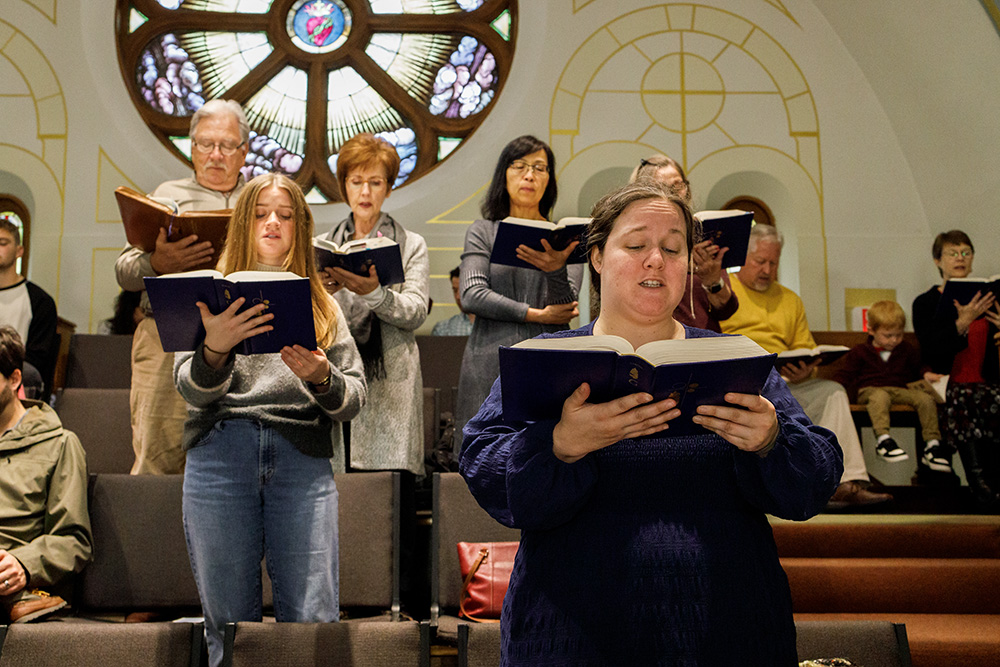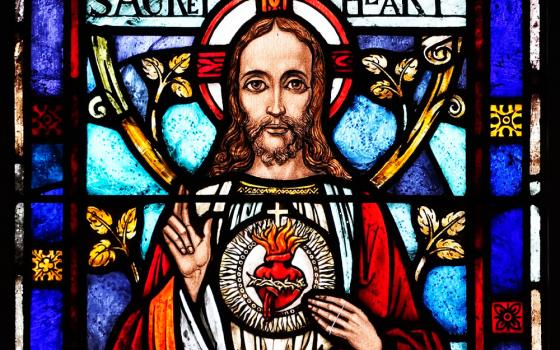
Choir members perform at Sacred Heart Catholic Church during morning Mass in Columbia, Missouri, on Sunday, Nov. 3. (Artem Baidala)
Maybe "All Are Welcome" after all.
Less than a week after it had taken effect, Bishop W. Shawn McKnight of Jefferson City, Missouri, rescinded his decree that blacklisted a dozen liturgical hymns from use in the diocese, the most popular of them being "All Are Welcome" by Marty Haugen, the diocese told the National Catholic Reporter Nov. 6.
In its place, McKnight issued a new decree calling for a consultative process in the selection of liturgical music for the central Missouri diocese. The new decree, issued Nov. 5, took effect immediately, and will remain in effect for one year on an experimental basis until musicians and liturgists in the diocese can talk things over.
The short-lived decree, "Suggested Mass Settings and Prohibited Hymns," also named three composers whose music was not to be performed in the diocese due to credible allegations of sexual abuse against them.
"The decision to prohibit specific songs and composers led to a spirited discussion, including on social media, as well as stories and opinions shared in some Catholic media outlets outside the diocese," McKnight told his diocesan newspaper, The Catholic Missourian, in a draft story emailed to NCR before its publication.
An earlier news account unveiling the hymnal blacklist was removed from The Catholic Missouria's website on Nov. 2. Diocesan spokesman Jacob Luecke said the story was taken down so that it could be updated with information about the new decree.
'Whenever we see this kind of fervor among the faithful, our church gives us the perfect way to respond — a synodal response.'
—Bishop W. Shawn McKnight
McKnight's new decree acknowledged that the rescinded version fell short of the Catholic Church's synodal initiative to include the laity, or non-clergy, in certain decision-making. On Oct. 26, just days before the blacklist was issued in Jefferson City, the Vatican released the final document from Pope Francis' three-year consultation on the future of the Catholic Church, calling for more participation for lay members.
"It is now clear that an authentically synodal process of greater consultation did not occur prior to its promulgation," McKnight said in his new decree.
In the draft article in The Catholic Missourian, McKnight acknowledged there was a spirited reaction in the diocese to the prohibited hymns list.
"It is inspiring to see such passion and enthusiasm about the music that enlivens our Catholic liturgies," he said. "Whenever we see this kind of fervor among the faithful, our church gives us the perfect way to respond — a synodal response.”
The turnaround was remarkable given that the original document had been years in the making before its Oct. 28 publication in a weekly chancery newsletter. Eight days later, the original decree, "Suggested Mass Settings and Prohibited Hymns," was out. A new one was in place, entitled "Promoting Active Participation in the Liturgy Through Sacred Music."
The new decree does not mention any forbidden hymns. While the prohibition on music from composers credibly accused of sexual abuse will remain in place, it does not name any specific composers. The decree said a list of such composers will be kept by the diocese and updated "from time to time."
In the original decree, McKnight said, "All hymns by these composers are strictly prohibited from use in the celebration of all liturgies in the Diocese of Jefferson City," This is being done, he said, "to prevent scandal from marring the beautiful celebration of the Eucharist."
One element of the new decree asks parishes to familiarize themselves with four sung Masses. "He emphasized that parishes are not being limited to four Mass settings," Fr. Daniel Merz, a pastor in Columbia, Missouri, who chairs the diocesan liturgical commission, said in the draft diocesan news article. "We're just saying, 'Please be familiar with these.' "
One Mass setting is the bilingual "Misa del Pueblo Inmigrante" ("Mass of the Immigrant People") by Bob Hurd, who had one song on the banned list in McKnight's now-rescinded decree. Another setting is a revised version of Haugen's "Mass of Creation," whose new lyrics reflect the texts in the 2010 General Instruction on the Roman Missal.
The new decree still relies on the U.S. bishops' Committee on Doctrine's 2020 document, "Catholic Hymnody at the Service of the Church: An Aid for Evaluating Hymn Lyrics," which was approved for publication by the bishops' Administrative Committee.
The 2020 bishops' document cites six standards in determining that a hymn may be unsuitable: deficiencies in the presentation of eucharistic doctrine, or of trinitarian doctrine, or in the doctrine of God and his relation to humans. Also listed as areas of concern included "a view of the church that sees her as essentially a human construction," a doctrinally incorrect view of the Jewish people, or with incorrect Christian anthropology.
The synodal process outlined in the new Jefferson City decree will involve leadership in the diocesan chapter of the National Association of Pastoral Musicians, a U.S. Catholic church membership group.
Advertisement








